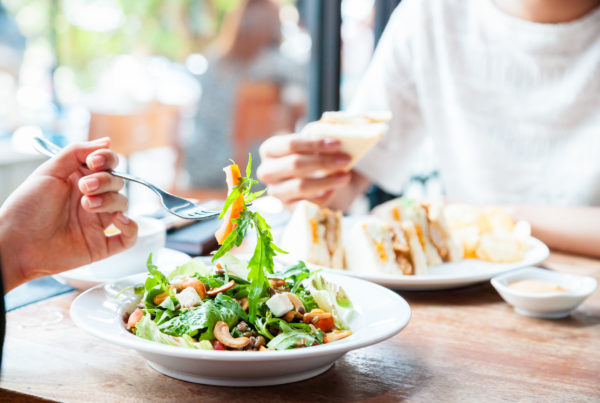”Massachusetts, did you know our nutrition can affect our sleep? You can read this week's article to learn more about how food relates to sleep, and the foods to focus on for more quality rest. We hope this helps you get better sleep!
Reading Time: 8 Minutes
MWi Hacks:
- Learn the key areas of nutrition that can impact the quality and quantity of your sleep
- Identify and try foods that can actually make you sleepy
MWi Summary:
- In general, a well-balanced diet that supports overall health will support a healthy sleep.
- Some foods that will help you fall asleep include turkey, dairy products, cherries, and kiwis.
- It is best not to consume caffeine at least six hours before bed.
- Eating too close to bedtime may disrupt sleep.
- Alcohol should be avoided at least four hours before bedtime.
A well-balanced diet is important for maintaining optimal health and reducing the risk of medical conditions like heart disease, stroke, and type 2 diabetes (1). Many people don’t realize that our dietary choices can also impact our sleep, including how long we sleep, the quality of our sleep, and even the content of our dreams.
What to Eat to Sleep Better at Night
In general, a diet that supports sleep is similar to one that supports a person’s overall health and helps to maintain a healthy weight. A well balanced diet focuses on nutrient-dense foods and limits foods that are higher in added sugars, saturated fat, and sodium (2).
Both diet and sleep can be challenging topics to research and it’s important to remember that everyone’s dietary needs are different. If you’re interested in improving your sleep through diet, talking to a doctor or nutritionist before making any dietary changes can be a helpful place to start.
Current evidence suggests that certain foods and dietary patterns can affect sleep. Below are some tips on what to eat before bed and diet adjustments that may help you sleep better.
Tips on Tryptophan
Many people believe that both turkey and milk are foods that can make you tired. Tryptophan, also called L-tryptophan, is an amino acid that is found in animal products like turkey, chicken, eggs, and fish, as well as in dairy products like milk, cheese, and yogurt. Consumption of tryptophan has been shown to reduce depression and increase sleep duration (3).
Sleep-Friendly Fruits
Cherries may help combat insomnia (4). Drinking tart cherry juice has been found to reduce the severity of insomnia and help people fall asleep faster. Research suggests that several types of cherries contain high amounts of melatonin, a sleep-promoting hormone.
Kiwi is another fruit that may promote sleep. Research has found that consuming a few kiwis an hour or two before bed may help people fall asleep faster, wake up less often during sleep, and stay asleep longer. While the exact reason for this relationship is still unclear, kiwis may promote sleep through their high concentrations of antioxidants and folate.
Be Cautious of Caffeine
Pouring yourself a cup of coffee is a common way to give yourself a boost of energy during the day. Unfortunately, drinking coffee too late in the day can interfere with sleep. Coffee contains caffeine, a naturally occurring ingredient in many foods (5). Caffeine is a stimulant, meaning that it can increase alertness and help people stay awake.
Coffee isn’t the only drink that contains caffeine. Many foods and drinks contain caffeine, including tea, soft drinks, and chocolate flavored products like ice cream, pudding, and even cereal. Avoiding caffeine before bed is important because caffeine can make it more difficult to fall and stay asleep. Research suggests that caffeine should be avoided for at least six hours before sleep (6).
Reduce Late Night Snacks
Eating too close to bedtime can increase the likelihood of disrupted sleep. A study examining the relationship between meal times and sleep quality found that young adults who ate within 3 hours of sleep woke up more often during the night (7) than those who did not. To avoid having late-night meals interrupt your sleep, try eating dinner a few hours before bed and keep snacking to a minimum.
Avoid Alcohol Before Bed
Drinking alcohol is a double-edged sword when it comes to sleep. While alcohol has sedative properties that may help some people fall asleep faster, it can also reduce sleep quality and cause people to wake up during the night (8). Alcohol can also lead to snoring, worsen existing sleep apnea, and increase the symptoms of other sleep disorders. To protect your sleep quality, set your last call to at least four hours before bedtime.
Make Sure You’re Getting Enough Key Nutrients
Having a diet that’s rich in nutrients is vital for good sleep. Large research studies have investigated potential links between nutrient deficiencies and short sleep times (9), usually defined as less than seven hours a night. While researchers are still studying this topic, people who don’t get enough sleep are more likely to be deficient in nutrients like calcium, magnesium, and vitamins A, C, D, and E.
Now that you know which foods help you sleep and which eating habits to avoid close to bedtime, you can adjust your diet to improve your sleep.
MWi would like to thank Reneé Prince for her expert insights that we were able to share with our community. To read the original article go to:
https://www.sleep.org/eat-to-sleep-better/
About the Author
Reneé Prince is a medical writer and editor that values transparency and integrity above all. She aims to make an impact in the digital space of health communication by creating accurate, well-researched content that helps audiences make informed decisions for their well-being.
Reneé entered the realm of medical writing after working as a technical writer for 4 years. While developing content for websites, reports, instruction manuals, and grant proposals for institutions ranging from local government agencies to local non-profits, she embraced her love of using communication to help others in her community.
After encountering personal health issues, however, Reneé realized how impactful clear, accurate, and empathetic health content can be. She then decided to pair her love of technical writing with her desire to help others by delving into the world of health communication, where she now focuses on crafting quality content that provides others with the information they need to make important health decisions.





